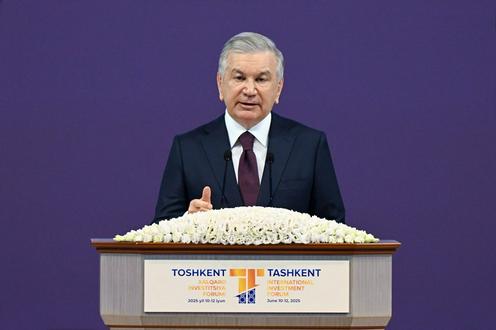“We are taking all necessary measures to ensure that the principle ‘New Uzbekistan is a land of great opportunity for investment’ is realized in practice.” This was the message from Uzbek President Shavkat Mirziyoyev at the opening of the fourth Tashkent International Investment Forum, according to the presidential press service.
Mirziyoyev highlighted several key areas:
First, he emphasized that global production chains need reliable rules to ensure a level playing field for all countries. He underlined the role of the World Trade Organization, which Uzbekistan plans to join next year.
Second, to create even more favorable conditions for foreign investors, the country has introduced a “national treatment” regime, ensuring equal conditions for foreign and domestic companies. Uzbekistan has also adopted a one-stop-shop approach for dealing with authorities and launched a system to protect investors from excessive inspections.
Third, in the ongoing privatization of state-owned enterprises, these assets are being transformed into major contributors to national prosperity. The National Investment Fund, managed by the international firm Franklin Templeton, now consolidates state shares in 18 large enterprises and banks, amounting to about $2 billion.
Fourth, transport and logistics are considered the lifeblood of the economy. As such, Uzbekistan is actively attracting capital to this sector. Projects include transferring airport operations in various cities to private investors, developing the “New Tashkent” urban project, and constructing a multimodal hub that integrates air, rail, and road transport, with an annual capacity of up to 20 million passengers.
Fifth, thanks to Uzbekistan’s foreign policy of openness and good-neighborliness, Central Asia has seen a significant shift toward regional cooperation. Over the past eight years, Uzbekistan’s trade with neighboring countries has grown 3.5 times, reaching $13 billion. Major joint investment projects are underway. In this context, Mirziyoyev proposed advancing a regional concept of a “Common Space for Investment and Trade.”
Despite global economic challenges, the president noted that Uzbekistan has shown promising results. Over the past few years, the country’s GDP has doubled, with a target of reaching $200 billion by 2030. Last year, Uzbekistan attracted $35 billion in investment and achieved $27 billion in exports, contributing to its rise in international rankings.
Mirziyoyev also outlined four strategic investment priorities for the country:
✅ Transition to green energy;
✅ Development of digital technologies and artificial intelligence as economic drivers;
✅ Modernization of the financial system, including reforms in banking, insurance, capital markets, venture funding, and startup support;
✅ Exploration and processing of critical technological minerals such as tungsten, molybdenum, vanadium, and titanium, which are in high demand amid the fourth industrial revolution.
According to Mirziyoyev, for Uzbekistan, investment is more than just capital—it means access to technology, knowledge, skilled labor, and integration into global production chains. In essence, it is about true development.
“Uzbekistan is creating all the conditions necessary for foreign investors who come to us with noble intentions. We fully support and guarantee their activities. In our country, every door is always open to you,” the president concluded.










